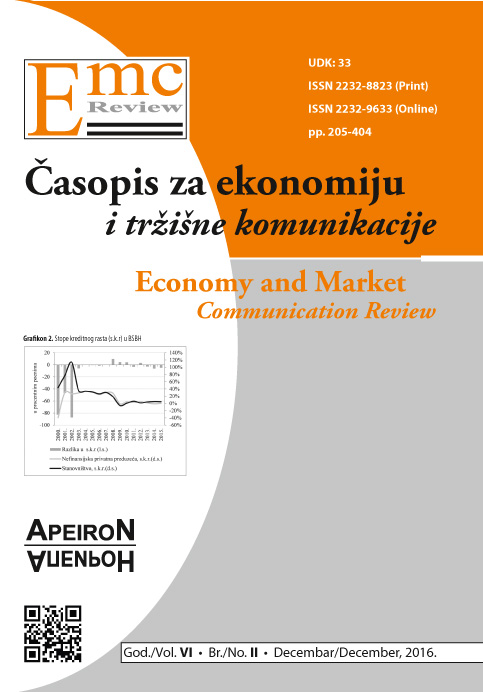DETERMINANTS OF CREDIT GROWTH IN BANKING SECTOR OF BOSNIA AND HERZEGOVINA // DETERMINANTE KREDITNOG RASTA U BANKARSKOM SEKTORU BOSNE I HERCEGOVINE
DOI:
https://doi.org/10.7251/EMC1602233JAbstract
Credit growth is function of several variables, which are from the domestic banks point of view internal and external. NPL and deposits, on bank level, nominal GDP growth, and inflation have biggest impact on credit growth. Credit growth is under direct and strong influence of global crises and of ECB monetary policy, and these variables influence is with time lag. Between factors which also influence credit growth, but which influence is not so statistically significant, like previous factors, distinguish themselves capitalization ratio and return on asset on banking sector level. Possibility of doing banking business without deposit insurance, putting limits on deposit rates and on deposit growth could contribute to decrease in banks deposit variability, and to smoothness in credit growth path, as well as insisting on capital ratio rising. If domestic economic policy want to manage credit growth in domestic banking sector it is necessary to increase quality of prudential regulation, to improve NPL management and credit risk management and to modify monetary regime, by granting permission to domestic central bank to provide credits to residents. Without providing credit to residents by Central bank of Bosnia and Herzegovina, it is not possible to achieve price stability and it is not possible to decrease deflationary pressure. Increase in capital ratio has positive impact on credit growth, and vice versa, and that is way increase in capitalization must object of permanent supervision. Since activity and profitability of systematically important banks are one of credit growth generator, banking supervision has to have particular strategy for big banks resolution. Low influence of previous credit growth on current credit growth is motive for active countercyclical economic policy.Downloads
Published
2017-01-03
Issue
Section
Чланци
